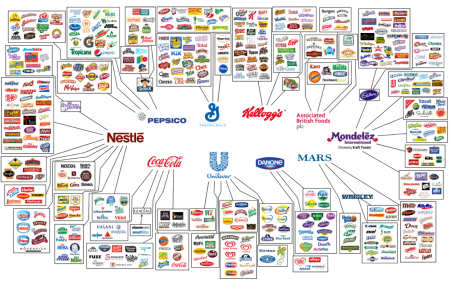From our fields to our forks, huge corporations have an overwhelming amount of power over our food supply every step of the way. Right now there are more than 313 million people living in the United States, and the job of feeding all of those people is almost entirely in the hands of just a few dozen monolithic companies. If you do not like how our food is produced or you don’t believe that it is healthy enough, it isn’t very hard to figure out who is to blame. These mammoth corporations are not in business to look out for the best interests of the American people. Rather, the purpose of these corporations is to maximize wealth for their shareholders. So the American people end up eating billions of pounds of extremely unhealthy food that is loaded with chemicals and additives each year, and we just keep getting sicker and sicker as a society. But these big corporations are raking in big profits, so they don’t really care.
If we did actually have a capitalist system in this country, we would have a high level of competition in the food industry. But instead, the U.S. food industry has become increasingly concentrated with each passing year. Just consider the following numbers about the U.S. agricultural sector…
The U.S. agricultural sector suffers from abnormally high levels of concentration. Most economic sectors have concentration ratios around 40%, meaning that the top four firms in the industry control 40% of the market. If the concentration ratio is above 40%, experts believe competition can be threatened and market abuses are more likely to occur: the higher the number, the bigger the threat.
The concentration ratios in the agricultural sector are shocking.
-Four companies own 83.5% of the beef market.
-The top four firms own 66% of the hog industry.
-The top four firms control 58.5% of the broiler chicken industry.
-In the seed industry, four companies control 50% of the proprietary seed market and 43% of the commercial seed market worldwide.
-When it comes to genetically engineered (GE) crops, just one company, Monsanto, boasts control of over 85% of U.S. corn acreage and 91% of U.S. soybean acreage.
When so much power is concentrated in so few hands, it creates some tremendous dangers.
And many of these giant corporations (such as Monsanto) are extremely ruthless. Small farmers all over America are being wiped out and forced out of the business by the predatory business practices of these huge companies…
Because farmers rely on both buyers and sellers for their business, concentrated markets squeeze them at both ends. Sellers with high market power can inflate the prices of machinery, seeds, fertilizers and other goods that farmers need for their farms, while powerful buyers, such as processors, suppress the prices farmers are paid. The razor-thin profit margins on which farmers are forced to operate often push them to “get big or get out”—expanding into mega-operations or exiting the business altogether.
Of course the control that big corporations have over our food supply does not end at the farms.
The distribution of our food is also very highly concentrated. The graphic shared below was created by Oxfam International, and it shows how just 10 gigantic corporations control almost everything that we buy at the grocery store…
And these food distributors are often not very good citizens either.
For example, it was recently reported that Nestle is running a massive bottled water operation on a drought-stricken Indian reservation in California…
Among the windmills and creosote bushes of San Gorgonio Pass, a nondescript beige building stands flanked by water tanks. A sign at the entrance displays the logo of Arrowhead 100% Mountain Spring Water, with water flowing from a snowy mountain. Semi-trucks rumble in and out through the gates, carrying load after load of bottled water.
The plant, located on the Morongo Band of Mission Indians’ reservation, has been drawing water from wells alongside a spring in Millard Canyon for more than a decade. But as California’s drought deepens, some people in the area question how much water the plant is bottling and whether it’s right to sell water for profit in a desert region where springs are rare and underground aquifers have been declining.
Nestle doesn’t stop to ask whether it is right or wrong to bottle water in the middle of the worst drought in the recorded history of the state of California.
They have the legal right to do it and they are making large profits doing it, and so they are just going to keep on doing it.
Perhaps you are thinking that you can avoid all of these corporations by eating organic and by shopping at natural food stores.
Well, it isn’t necessarily that easy.
(Read the rest of the story here…)

